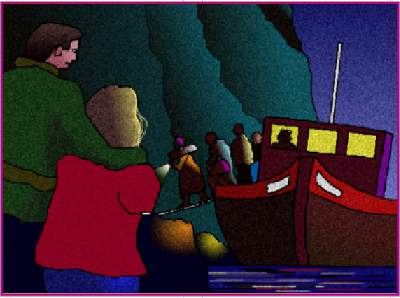|
|
| Linguapress.com | Advanced level reading resources | Intermediate reading resources | English grammar online | Language games and puzzles |
Intermediate
English
| Linguapress for mobiles - home page | English Grammar | Free advanced level resources | Free intermediate level resources |
 Intermediate
English
Intermediate
Englishon your mobile

ONE FOGGY NIGHT - a short story
by Andrew Rossiter
WITH AUDIO. ►: Click to open/close audio player
Part 2
Two policemen are looking for a couple of missing teenagers; they have
just found the teens' car, but not the kids. Instead, they found a lot
of money in the car. What can be happening ?
 "This is a missing persons call." Constable Shepton looked at the
description that Mrs. Hoskins had just given, then spoke into the
microphone again.
"This is a missing persons call." Constable Shepton looked at the
description that Mrs. Hoskins had just given, then spoke into the
microphone again. "The lad's 17, darkish hair, five foot nine and quite thin. He's wearing a dark green bomber jacket. Name Paul Hoskins. The girl's called Melanie Hoardley, age 15, looks older. Blonde shoulder-length hair; wearing jeans and a sort of red anorak. Check all clubs and sea front. Stop any suspicious vehicle within 10 miles."
Four police cars had come together beside the harbour.
"You don't think they jumped in, do you, copper?" asked one of the on-lookers, who had appeared from nowhere even though it was almost 3 a.m.
"I really don't know," said the Inspector. "Now would you please move back. There's nothing to see. This is just a routine investigation."
"Car PB," said the voice on the radio. "Please check out the eastern Esplanade, as far as the cliffs."
"Let's go," said Wells.
The mist had come in again, just enough to hide the tops of the buildings on the landward side of the Esplanade; but as the buildings got smaller, the fog seemed to thicken. By the time the patrol car reached the end of the Esplanade, at the foot of the cliff, visibility was down to little more than ten yards.
"I don't know how we're meant to check anything in this," said Bradstock.
"Can't see anything, anyway," Wells replied. He stopped the car, and the two policemen got out.
They could hear the sound of the waves slopping against the foot of the sea wall, fifteen feet below them.
Bradstock leaned over. In the darkness, the sea looked black, cold and very uninviting. "High tide," he remarked.
"Yeah," said Wells. "Going out now. Let's walk along as far as the rocks. There'll be enough sand by now."
They locked the car, and took two powerful torches. Bradstock switched on his walkie-talkie. At the end of the Esplanade, narrow concrete steps led down onto the sand, above the high water mark.
Where it has been washed by the waves, the sand was hard and smooth; but the going was not always easy and from time to time the two policemen had to scramble onto the rocks to avoid getting their feet wet.
"What's the point of looking along here?" asked Wells, suddenly stopping. "We saw them driving back to the middle of town. They won't have come back this way again, will they?"
"What if someone else had nicked their car?"
"They'd have walked to a phone box, wouldn't they?"
The men walked on, the sound of the gently breaking waves echoing off the cliffs that they could feel but not see rising steeply up beside them.
By day, the cliffs would have been alive with the sound of seagulls; by night, there was no noise to mix with the breaking waves.
Then Brad froze.
"What's that?"
From somewhere at the foot of the cliffs, a voice was calling. Scrambling up the stones, towards the spot the sound seemed to be coming from, Wells almost fell over two bodies lying there. "Quick, a knife," he said. "Undo them!"
"Oh thank God," said the girl.
"Are you Melanie?" asked Brad.
"Yeah; thank God you came."
"What happened?"
"Smugglers," said the youth, as Wells cut the cloth from round his mouth. "We were just walking along when we saw this fishing boat coming in through the mist, so we went over to watch; then all these men got off it, without saying a word. I think they must have been immigrants or something; they had dark skin. Then two other guys, white guys, just jumped on us and tied us up. They took my wallet and my Mum's car keys."
"O.K, " said Wells. "I reckon we know the rest already. You'd better come along with us."
And he turned on his walkie-talkie. "PB to base. We have the two youngsters...."
WORDS
suspicious: strange - on-looker: person looking at something - routine: ordinary - landward: towards the land - high tide: the time when the sea level is highest - going out: the tide is going out (the sea level is falling) - the going: walking - scramble: climb - nick (slang): steal, take - seagulls: white sea birds - smuggler: person importing contraband -
Return to part 1
Return to Linguapress site index
Copyright © Linguapress.com Do not copy this document to any other website
Copying permitted for personal study, or by teachers for use with their students.
Student worksheet
Linguapress.com Intermediate EnglishOne Foggy Night - Part 2
Retelling the story:After Wells and Bradstock returned to the police station, they had to write out a report. Imagine what this report said, by completing these sentences. You may need to remember events from part 1 of the story . Write your report in the boxes with the 👉 marker. The box will grow to take your text.
To save your answers, select all the boxes and copy them into a text document or an email.
We
were on duty on the Esplanade when
We couldn’t really see very much because
When a suspicious car
We found the car
When we looked inside
Next we were asked to
When we reached
We decided to
Just as we reached
When we went to
It was the two
they told us
Prepositions:
Replace all the missing prepositions and adverbs in these extracts from the story; try to do this first without consulting the text!
They could hear the sound the waves slopping the
foot the
sea wall, fifteen feet them.
Bradstock leaned . “High tide,” he remarked.
“Yeah,” said Wells. “Going now. Let’s walk far the rocks. There’ll be enough sand now.”
Bradstock switched his walkie-talkie. the end the Esplanade, narrow concrete steps led the sand, the high water mark.........
“Smugglers,” said the youth, as Wells cut the cloth his mouth. “We were just walking when we saw this fishing boat coming the mist, so we went to watch; then all these men got it, saying a word.
Bradstock leaned . “High tide,” he remarked.
“Yeah,” said Wells. “Going now. Let’s walk far the rocks. There’ll be enough sand now.”
Bradstock switched his walkie-talkie. the end the Esplanade, narrow concrete steps led the sand, the high water mark.........
“Smugglers,” said the youth, as Wells cut the cloth his mouth. “We were just walking when we saw this fishing boat coming the mist, so we went to watch; then all these men got it, saying a word.
FOR TEACHERS
Using this story in class :
Introduction: Before taking the second half of this short story, have students summarise in as much detail as possible what happened in the first half. Do this orally in class. Start the ball rolling by starting the story yourself:One evening in the Autumn, a woman called Mrs. Hoskins phoned the police station, saying that ......
Try and make sure that you involve all pupils, not just a talented few.
Anticipating: What do your students imagine has happened to Paul and Melanie?
Language points: as you go through this text slowly with your class, either reading or listening to the audio file, concentrate on the following language points:
a) the use of the pluperfect (had). In English, this is only used to present anteriority; sometimes the anteriority is clearly stated (he looked at the description that Mrs. Hoskins had given), sometimes it is implicit (Four police cars had come together (before the next scene took place) / the onlooker had appeared (before he asked the question).
b) Modal verbs, in particular would have and must have towards the end of the text.
c) Use of any. Note that any in para 1 corresponds to a selective synonym of all.
Remembering: Once you have been through the story carefully, read it out loud to your class, pausing at suitable points, and asking pupils to remember what came next.
.
This teaching resource is © copyright Linguapress .
Republication on other websites or in print is not authorised
| Linguapress home | English grammar | Discover Britain |
Linguapress.com
Intermediate level EFL resource
Copyright notice.
All articles published on this website remain the copyright © of Linguapress.com and/or their individual authors.
Reproduction is authorised exclusively for use by students for personal use, or for teachers for use in class.
This resource is © copyright Linguapress renewed 2024
Originally published in Freeway magazine.
Multi-copying of this resource is permitted for classroom use. In schools declaring the source of copied materials to a national copyright agency, Linguapress intermediate level resources should be attributed to "Freeway" as the source and "Linguapresss France" as the publisher.
Linguapress.com -
Free EFL reading resources
Intermediate level EFL resource
Short
story
| A
selection of other resources in graded English from Linguapress |
| Selected pages |
| Intermediate resources : |
| Are you a brand slave ? |
| Who is James bond ? |
| Sport: The story of football and rugby |
| Christmas in Britain |
| USA: Who was Buffalo Bill? |
| USA: The story of Coca Cola |
| More: More intermediate reading texts |
| Advanced level reading : |
| Charles Babbage, the father of the computer |
| America's Drive-in Movie Theaters |
| USA - Discovering Route 66 |
| London's Notting Hill Carnival |
| More: More advanced reading texts |
| Selected grammar pages |
| Online English grammar |
| Noun groups in English |
| Word order in English |
| Reported questions in English |
| Miscellaneous |
| Language and style |
| Word stress in English |
| The short story of English |
Copyright notice.
All articles published on this website remain the copyright © of Linguapress.com and/or their individual authors.
Reproduction is authorised exclusively for use by students for personal use, or for teachers for use in class.
This resource is © copyright Linguapress renewed 2024
Originally published in Freeway magazine.
Multi-copying of this resource is permitted for classroom use. In schools declaring the source of copied materials to a national copyright agency, Linguapress intermediate level resources should be attributed to "Freeway" as the source and "Linguapresss France" as the publisher.
Linguapress.com -
Free EFL reading resources